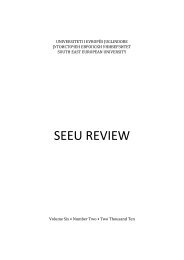SEEU Review vol. 5 Nr. 2 (pdf) - South East European University
SEEU Review vol. 5 Nr. 2 (pdf) - South East European University
SEEU Review vol. 5 Nr. 2 (pdf) - South East European University
Create successful ePaper yourself
Turn your PDF publications into a flip-book with our unique Google optimized e-Paper software.
<strong>SEEU</strong> <strong>Review</strong> Volume 5, No. 2, 2009<br />
members 10 . The <strong>European</strong> Central Bank members mandate is 8 years;<br />
minimum 5 years 11 and they can not be reappointed.<br />
According to the statute, the governor of a Central Bank can be dismissed<br />
only when he doesn’t accomplish his/her duties or when (s)he is a bad<br />
manager of the central bank 12 . To avoid bad management, chief executive<br />
officers must have a high level of professional qualification 13 .<br />
<strong>South</strong>eastern Europe central banks have a high level of institutional<br />
independence because these banks generally are independent from other<br />
institutions in achieving their objectives. We say “generally” because the law<br />
of the central bank in Macedonia and the law of the central bank in Serbia<br />
states that the central bank must coordinate with the respective government<br />
for the achievement of its objectives. So, these central banks are not free to<br />
state their monetary policy.<br />
<strong>South</strong>eastern <strong>European</strong> central banks match one of the conditions of the<br />
Tractate - the mandate of the governor and the mandate of Supervisory<br />
Council members is generally above 5 years, and the governor and chief<br />
executive officers must be experienced and have academic titles. The laws<br />
determine the incompatibility of the position of Supervisory Council<br />
member with other functions. Also the governor is dismissed when he<br />
commits a crime, makes fake declarations, misses the Council meetings, etc.<br />
The laws of <strong>South</strong>eastern Europe countries are somewhat problematic<br />
when we discuss about the Supervisory Council members dismissal. Some of<br />
the articles must be reduced and simplified. Financial independence is made<br />
of two components: limits to government lending and budgetary<br />
independence. Some of the countries that we are studying prohibit direct<br />
credit to the government. So, they have solved the problem of financial<br />
independence. Albania and Serbia do not prohibit direct credit to the<br />
government 14 . Croatia, Albania, Montenegro and Serbia do not prohibit<br />
indirect credit to the government 15 . Only Bosnia – Herzegovina prohibits<br />
both direct and indirect credit (they have currency board). Also to the<br />
ownership and management of the budget is a very important component. In<br />
Albania, Croatia, Macedonia and Romania the capital is owned by the state.<br />
In table 2 is given the information about the second component (budgetary<br />
independence). There can be noticed that the central banks allocate part of<br />
their profit to the reserve fund. These banks also allocate the residual profit<br />
to government budget.<br />
10<br />
11<br />
12<br />
13<br />
14<br />
15<br />
Article 108 of Tractate and article 7 of Statute<br />
Articles 11 (2) and 14 (2) of the Statute<br />
Article 14 (2) of the statute<br />
Article 112 (2) (b) of Tractate and article 11.2 of statute<br />
Direct crediting is allowed in special cases and it is well controlled<br />
Central banks can buy treasury bonds in the secondary market.<br />
57

















